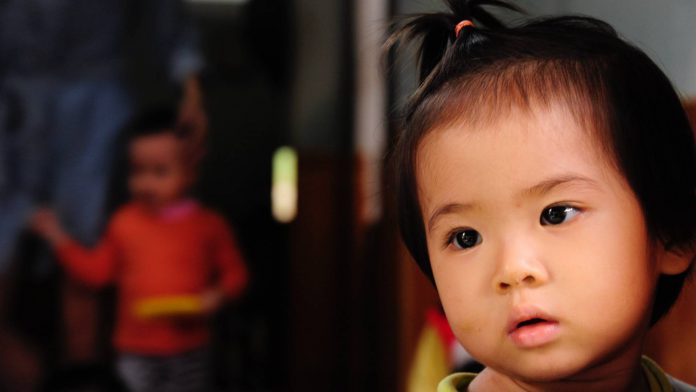One of the things parents are concerned about is their baby’s language development. So much so that questions on why a baby is still not talking at this age is a normal thing to see in mommy forums. But when exactly can we expect to hear our baby’s first words? At what age is “baby babble” still a cause for concern? Here are a few things parents should know:
Baby Talk Milestones
Baby milestones can vary from one baby to another. But here are a few developmental milestones related to language and speech to give you an idea:
3 Months: Your baby listens to your voice, watches you as you talk, and turns his attention towards other voices, sounds, or even music inside your home. At the end of 3-months, your baby should begin cooing — a gentle, happy, repetitive, sing-song vocalization.
6 Months: Your baby should begin babbling different sounds, such as “ba-ba” or “da-da.” At the end of 6 or 7 months, he should be able to respond to his name, recognize repetitive language, and let you know if he’s happy or upset using the tone of his voice. Do note that while some parents might take the syllables “da-da” at this stage to refer to daddy, babbling or “speaking” at this age is usually made up of random syllables without any meaning or comprehension.
9 Months: At this age, your baby can understand several basic words such as “no” or “bye-bye.” They might also start to use a range of consonant sounds and tones of voice.
12 to 18 Months: Your baby might begin to say a few simple words such as “mama” or “papa” as he turns 1-year-old and also understands its meaning. He should also be able to understand or respond to simple, one-step requests such as, “Please put that down.”
18 Months: Your baby should be able to say a few simple words, and point to people, objects, and body parts you say. He should be able to repeat words or sounds that he hears from you, but might still leave off beginnings or endings of words like “mi” for milk, or “daw” for dog.
24 Months: At 2-years-old, your baby should be able to string together short phrases of two to four words, such as “Bye-bye, mommy,” or “I want.” He’s also starting to learn that some words can also pertain to abstract ideas and not just objects.
36 Months: Your baby’s vocabulary should expand rapidly at 3-years-old, including understanding symbolic and abstract language like “now,” feelings like “sad,” and even spatial concepts like “out.”
Can we boost our baby’s language development?
Parents can help their babies learn to talk by:
Watching and responding. Familiarize yourself with your baby’s actions and respond accordingly, such as raising his hands when he wants you to pick him up, handing you a toy when he wants to play or pushing away his plate when he’s already full. Take note of these and try to respond to him to encourage his early communication skills.
Listening and answering. Watch out for your baby’s cooing and babbling and once he does, answer him by cooing and babbling as well. Babies love to imitate their parents and this includes the sound you make, even the tone and pitch that you use. So remember to be patient and “talk” to your baby as much as possible.
Praising. Don’t forget to smile and cheer on your baby whenever he coos, babbles or tries to communicate with you, no matter how small or confusing it might be. Babies also get their communication cues via your and other adults’ reactions.
Following their lead. Talk to your baby as much as possible. Babies love to hear their parents’ voices so letting them hear your voice by talking to them will encourage them to talk more. So do more baby talk, but remember to use simple words using the proper pronunciation.
Encouraging him by elaborating. Encourage your baby to talk by presenting him with more opportunities to do so. For example, if he points at an apple and makes a sound, don’t give it to him outright. Point to it and say something along with the likes of, “Do you want an apple? Are they juicy or crunchy?”
Narrating. Help your baby connect experiences and items to speech further by talking or narrating about what you’re doing with him or your routines. For example, you can say — “Let’s start to wash your hair” during bath time, or “I’ll cut your bread for you” during mealtime.
Being patient. It might be hard to understand what your baby is saying, but chill and just hold on. Just keep on encouraging him to communicate by asking questions and repeating back what you think he’s trying to say.
Letting him lead. Follow your child’s lead during playtime or in other activities. Doing so will show him that communication is a two-way game of talking and listening, and leading and following.
Playing. Letting your child play, pretend, and imagine out loud as much as he wants can help in developing his verbal skills.
Reading aloud. Encouraging your child’s love of reading at an early age can boost his communication and reading comprehension skills.
However, if you are still concerned about your child’s language development, then it’s best to talk to your child’s pediatrician. He can assess and recommend tests that might address your concerns. Remember, speech delay can be brought about by several factors, and the important thing is to diagnose and address it ASAP to help your child reach his full potential.
Reference: WebMD
Join our MomCenter Community on our Facebook page and Facebook group for more insights on motherhood and parenting.





